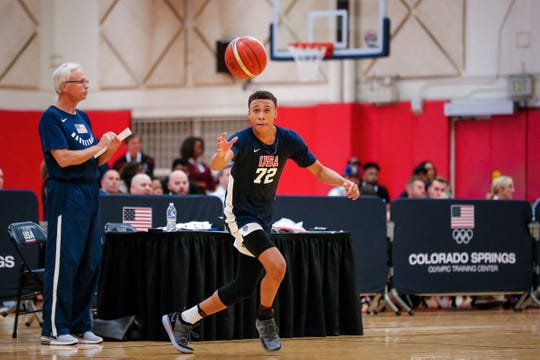News trend, Sport
Opinion: RJ Hampton passing on college basketball is what NCAA wants, but won’t start trend
Opinion: RJ Hampton passing on college basketball is what NCAA wants, but won’t start trend
Shortly after announcing on ESPN’s “Get Up” Tuesday that his path to becoming a lottery pick in the 2020 NBA draft would go through pro basketball in an Australian league next season rather than Kansas, Memphis or Texas Tech, R.J. Hampton posted a photoshopped picture of himself in a New Zealand Breakers jersey on his Twitter account.
In the background, in big block letters are the words “My Way.” And in the caption, Hampton wrote, “Big bag got em big mad.”
But aside from a handful of Kansas fans who were counting on Hampton to lift them into the top 10 next season and maybe a few over-traveled NBA scouts who will now have to make a couple extra trips Down Under, who is actually mad?
“There needs to be the ability for a young person and his family to say, you know, what I really want to do is just become a professional ball player,” NCAA president Mark Emmert said at the 2018 Final Four. “And they ought to be provided that opportunity if they don’t want to go to college.”
But to say that Hampton is about to inspire an exodus of elite basketball prospects from using the collegiate system as a springboard to the NBA is just as wrong now as it was when people said it years ago with Brandon Jennings, Emmanuel Mudiay and Darius Bazley.
Sure, there’s a difference with Hampton in that he’s going to the Australian league purely as a choice, whereas others had eligibility or academic concerns that basically took the college option away from them.
The bottom line, though, is that for all its flaws and inequities, the NCAA has constructed the best developmental path for most players.
Sure, there’s an obvious benefit to collecting a high six-figure or seven-figure check as an 18-year old, to being able to train full time without worrying about a class schedule or NCAA rules that limit how much interaction coaches can have with players. And of all the overseas options, Australia might make a lot of sense for some people given the relatively easy cultural and language transition and an interest in developing players for the NBA draft that wouldn’t exist at the top level in Europe.
But it’s also a really long way from home and millions of miles from the consciousness of American basketball fans, which matters to a lot of people. While Hampton can sign a shoe deal right now, he’ll never have what someone like Zion Williamson or Trae Young had with the platform to establish their star status before ever stepping foot in the NBA.
There’s no one-size-fits-all answer here. The pro life can be hard for an 18-year old in a grown man’s league. There are no charter jets or five-star hotels like you get at Duke or Kentucky. While Hampton is playing in front of 6,000 people in Illawarra, his peers are going to be in the NCAA tournament, which for many of them will be a meaningful experience for the rest of their lives.
Hampton simply didn’t view college the same way, and there’s absolutely nothing wrong with that.
“My dream has never been to play college basketball,” Hampton said on ESPN. “My dream has always been to get to the next level and I think this was the best route for me to live like a pro and play with grown men every day and not kind of have to juggle books and basketball and focus on my main goal.”
In other words, this doesn’t seem like a compensation decision. It’s not a name, image and likeness decision, although the NCAA’s current stance on that is still hopelessly outdated and flawed.
Whether it works out for Hampton or not, this is a basketball decision with no guarantees it will benefit his draft position or his long-term potential. But there wasn’t a guarantee either in coming to college, where some players like him have increased their value, others have decreased and some acted like they simply didn’t want to be there.
And for the last group, the NCAA has been saying all along: Don’t come. It’s about time someone finally took them up on that.

